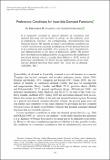Preference conditions for invertible demand functions
Date
01/05/2022Metadata
Show full item recordAbstract
It is frequently assumed in several domains of economics that demand functions are invertible in prices. At the primitive level of preferences, however, the corresponding characterization has remained elusive. We identify necessary and sufficient conditions on a utility-maximizing consumer’s preferences for her demand function to be continuous and invertible: strict convexity, strict monotonicity, and differentiability in the sense of Rubinstein (2006). We further show that Rubinstein differentiability is equivalent to the indifference sets being smooth, which is weaker than Debreu’s (1972) notion of preference smoothness. We finally discuss implications of our analysis for demand functions that satisfy the “strict law of demand.”
Citation
Diasakos , T & Gerasimou , G 2022 , ' Preference conditions for invertible demand functions ' , American Economic Journal: Microeconomics , vol. 14 , no. 2 , pp. 113-138 . https://doi.org/10.1257/mic.20190262
Publication
American Economic Journal: Microeconomics
Status
Peer reviewed
ISSN
1945-7669Type
Journal article
Collections
Items in the St Andrews Research Repository are protected by copyright, with all rights reserved, unless otherwise indicated.

